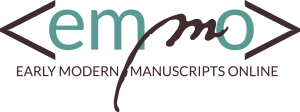Early Modern Manuscripts Online: New Directions in Teaching and Research
A program co-sponsored by the Folger Institute and the Early Modern Manuscripts Online project
Early Modern Manuscripts Online (EMMO) is an IMLS-funded initiative at the Folger Shakespeare Library that promotes paleography primarily through online transcribing and encoding. EMMO will be the the subject of—and occasion for—a conference about the influence of digital scholarship on manuscript studies as well as the ways in which our understanding of the early modern humanities is changing as a result. In addition to introducing the searchable EMMO corpus of encoded transcriptions (many of them drawn from crowd-sourcing), conference sessions will address emerging scholarly trends, collaborative research projects, new methods of teaching paleography with digital tools, and genre-specific topics.
Please direct any questions to institute@folger.edu.
Schedule
Unless otherwise specified, all sessions take place in the Folger Board Room
Thursday, 18 May 2017
9:00 a.m.
- Coffee and Pastries (Folger Tea Room)
9:30
- Welcoming Remarks
- Heather Wolfe, Folger Curator of Manuscripts and EMMO Principal Investigator
- Owen Williams, Assistant Director, Scholarly Programs, Folger Institute
9:45
- Roundtable: EMMO Progress report
- Chair: Owen Williams
- Transcribing in "Shakespeare's World" and Dromio: Heather Wolfe and Sarah Powell, EMMO Paleographer
- Database Development: Michael Poston, Folger Data Architect, and Paul Dingman, EMMO Project Manager
- EMMO’s Place in the Folgersphere: Eric Johnson, Folger Director of Digital Access
11:00
- Break
11:15
- Roundtable: EMMO Pedagogical and Research Community
- Chair: Paul Dingman
- Jennifer Munroe (University of North Carolina, Charlotte) on EMROC
- Joshua Eckhardt (Virginia Commonwealth University) on Dromio in the college classroom
- Ivan Lupić (Stanford University) on Dromio in the college classroom
12:30
- Lunch in the Foulke Conference Room (301 East Capitol Street, SE)
2:00
- Workshops: Breakout Session I
- A) Getting Started with Dromio: A tutorial on using Dromio as a transcription environment
- B) Using Manuscript Metadata: Research possibilities
- C) Organizing and Leading a Transcribathon
3:00
- Folger Tea (Folger Tea Room)
3:30
- Workshops: Breakout Session II
- See above for session descriptions
4:30
- Reports from the floor on breakout sessions
5:00
- Brews and Brevigraphs (Foulke Conference Room, optional)
- Transcription contests; door prizes; pizza and local brews
Friday, 19 May 2017
10:25
- Call to Order
10:30
- Roundtable: Putting Transcriptions to Work I: Texts
Chair: Wendy Hyman
- Telling Stories with Accounts
- Alison Wiggins (University of Glasgow) and Paul Dingman
- Telling Stories with Accounts
- Manuscript Arcadia
- Joel Davis (Stetson University)
- Manuscript Arcadia
- Paper and Water in Early Modern Recipes
- Elaine Leong (Max Planck Institute) and Hillary M. Nunn (University of Akron)
- Paper and Water in Early Modern Recipes
- Women’s Voices
- Victoria Van Hyning (Oxford University, Shakespeare’s World)
- Women’s Voices
- Manuscript to Print to Manuscript
- Margaret J.M. Ezell (Texas A&M University)
- Manuscript to Print to Manuscript
12:00
- Lunch on your own (suggestions provided in folders)
1:30
- Roundtable: Putting Transcriptions to Work II: Corpus
- Chair: Phillip Palmer
- Comparing Print and Manuscript Corpora
- Anupam Basu (Washington University in St. Louis)
- Comparing Print and Manuscript Corpora
- Semantic Models of EMMO Manuscripts
- Michael Witmore (Folger Shakespeare Library)
- Semantic Models of EMMO Manuscripts
- Network Analysis of Manuscript Correspondence
- Ruth Ahnert (Queen Mary University of London)
- Network Analysis of Manuscript Correspondence
- Historical Linguistics
- Philip Durkin and James McCracken (Oxford University)
- Historical Linguistics
3:00
- Folger Tea
3:30
- *Fishbowl: EMMO and the Futures of Manuscript Studies
- Fish wranglers: Heather Wolfe and Owen Williams
- First fish: TBD
- Drawing on the expertise of both speakers and attendees, Fishbowls are small group discussions in which 5 initial participants face one another in a circle, in the middle of the larger audience. Participants cycle out as audience members join the inner circle to create dialogue across perspectives and different types of research. (Definition lifted from https://arhusynergy.umd.edu/research/digital-humanities)
5:00
- Closing Reception (Founders' Room, Folger Shakespeare Library)
